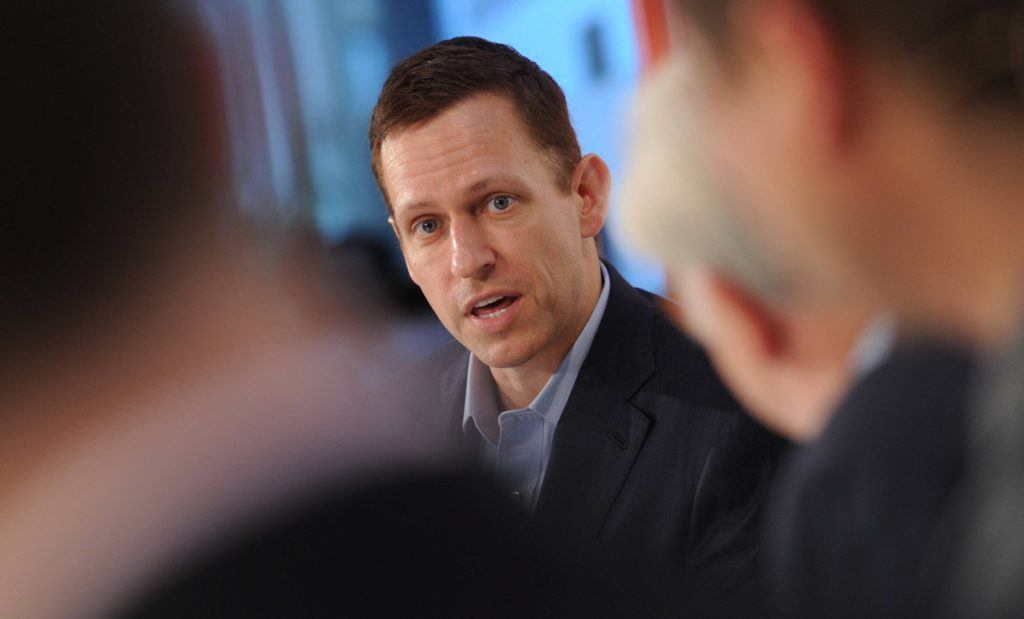
This is the first of ten themes in Nigel Cameron’s open letter to Mark Zuckerberg, exploring obstacles to him seeking the US presidency. Click here for whole series.
While most of us love Facebook, I’m not sure we love a vast corporate monopoly. And it’s obvious that you are one. Your first big backer, Peter Thiel, is so proud of the fact he’s going around saying that monopolies are wonderful and we need more of them. “Competition is for losers.” Yes, he said that[20. Peter Thiel in the Wall Street Journal, 12 September, 2014. “Competition Is for Losers. If you want to create and capture lasting value, look to build a monopoly.” The article ends like this: “Tolstoy famously opens Anna Karenina by observing: “All happy families are alike; each unhappy family is unhappy in its own way.” Business is the opposite. All happy companies are different: Each one earns a monopoly by solving a unique problem. All failed companies are the same: They failed to escape competition.”].
And Peter Thiel is on your board. That suggests you don’t mind his views – or perhaps you share them?
There’s really never been a monopoly like yours – the scale of what you’ve built is astonishing:
- Every month, there are two billion users around the world; more than a third of the adult members of the species. With India just ahead of the USA[21. Statista, reporting 241 million users of Facebook in India and 240 million users in the USA.].
- In the US alone there are 240 million.
- More than 40% of Americans are reported to get “news” from Facebook[22. NiemanLab, 26 May 2016, reports research from Pew: “Two-thirds of Facebook users access news on the social platform, and with 67 percent of U.S. adults active on Facebook, that translates to 44 per cent of the overall US population which accesses news on the social platform, the study said.”].
- Facebook and Google together now account for one-fifth of global advertising[23. The Guardian, May 2, 2017], and online ads have now overtaken television.
For an example of monopolistic behaviour, see Brian Feldman, New York Magazine: “Is Facebook a Monopoly? Just Ask Snapchat.”[24. New York Magazine, 14 April 2017.]
Of course, as leader of a company it’s not your job to police competition policy – whether in Washington or in Brussels or in any other key market. But the rise and rise of the tech monopolies is worrying a lot of people on left and right alike. Bill Kristol, lightning-rod of Washington’s neo-conservatives, has just launched a new effort in partnership with well-known Democrat Bill Galston. And the first item on their joint agenda? You guessed. Taking down the tech monopolies. Eleanor Clift of the Daily Beast[25. Daily Beast, 11 September 2017], talking to Galston, found that the numbers didn’t so much talk for themselves, but shouted:
“Just look at the figures, says Galston. “John D. Rockefeller would have died for a market share like that.” Rockefeller’s Standard Oil company epitomised the excesses of last century’s robber barons. Today, one out of every two dollars spent online goes through Amazon. Facebook and Google got 99 per cent of the revenue growth from digital advertising last year. Facebook owns 77 per cent of mobile social traffic.”
While the American Left, epitomised by Senator Warren, has been more willing than the US Right to take on monopolies in recent years, the tech giants have been the exception. “Silicon Valley is part of the Democratic base,” notes Clift, “providing mega-donations and votes.” Some estimates suggest 80% of “tech cash” goes generally to the Democrats[26. The Hill, 6 July 2016.] but went to Hillary Clinton rather than Donald Trump by 60-to-1 [27. CNBC, 7 November 2016.].

So what can you do?
Here are some suggestions.
You really need to come out in favour of market capitalism – and against monopolies. As President you will need to police a market-place full of powerful crony-capitalists, every one of which is a rent-seeker or monopolist or wannabe. And, Zuck, running one yourself isn’t a great start. But there are commitments you can make that would make quite a difference:
- First, make it absolutely clear that you are an undying fan of the market capitalism that enabled Facebook to succeed in the first place. (Bye-bye, Myspace!)
- Then give us an assurance that you don’t plan to take over any more potential rivals (as you did with WhatsApp and Instagram) – because you really will welcome their healthy competition – or do another ‘Sherlock’ on the likes of SnapChat[28. NYMag, 14 April 2017.].
- And I’m hardly the first person to suggest that you open up Facebook’s APIs – the keys to enable other programmes to connect with Facebook, so the powerful network effects that the internet makes possible don’t lock us all in to a single, monopoly platform[29. “Application programme interfaces” are the keys to enable other apps to connect with Facebook – so smart developers will be able to come up with new ways of using Facebook – and integrate the platform with other online services. More here Wikipedia Open API.].
- Then assure us that you will soon roll out a Facebook-for-a-fee alternative to the fuzzy barter arrangement we all use at the moment. So for $x a month, users have an option to use the service while keeping all their data private (and getting no ads or merely generic, untargeted ones). This would also make all of us much more aware of how Facebook actually makes its money – and that it’s really an enormous and highly-profitable corporation.
- It may seem too much to ask, but I’ll ask it anyway: you could then assure us that your lobbyists in Washington and Brussels and other capitals will hold back from lobbying against efforts to use competition policy against your company (or any others). What, by the way, was the objective of the $2.38 million you spent on Washington lobbying[30. The Register, 21 July 2017 reported that “In the second quarter of 2017 – April through to June – Google spent $5.93m on sending its representatives to meet with Senators. Amazon came next with $3.21m, then Facebook with $2.38m and finally Apple with $2.2m.”] in the second quarter of this year?
I know, the monopoly issue is hardly a simple one. A hundred years ago enormous public concern and some brilliant campaigning journalism[31. For example by the pioneering journalist Ida Tarbell. See UnHerd’s short video tribute to her, narrated by Liam Halligan.] led the United States to take down destructive monopolies (the “trusts”), a tradition that continued right up to the break-up of the AT&T telecommunications monopoly into the Baby Bells in 1982[32. Andrew Beattie, “Why is the 1982 AT&T breakup considered one of the most successful spinoffs in history?”].
Since then we have been kinder to monopolies, at the very time that technology has enabled new kinds of monopolies to flourish. But the pendulum will swing back as political interest on left and right builds to hold to account those who – like you – have amassed vast fortunes with your creative use of what was, let’s face it, originally publicly-funded US government technology[33. Mariana Mazzucato’s The Entrepreneurial State (Anthem Press, 2013) powerfully summarises the manner in which the US Government either funded or in some cases directly developed the core drivers of value in Silicon Valley’s technology.].
One reason we have not so far seen much backlash against Facebook (and Google) is of course that unlike traditional companies (the trusts of the early 20th century, and AT&T more recently) most users don’t think of themselves as customers. The service looks as if it’s “free,” and Facebook (like Google) some sort of charity. Of course, we pay with data, or you would not be making any money. And you are making a lot.
So we need you to come out as a crusading fan of innovation and market capitalism, not a contented beneficiary of monopoly power. Because people from Senator Elizabeth Warren, scourge of financial and corporate abuses, on the left, and Bill Kristol, godfather of the anti-Trump right, are calling for it and will call for it until the monopolies are reined in.
Will this cause you discomfort? I expect so. But hey, you’re not going to end up a pauper. And you’re the one who looks like he wants to be George Washington’s successor.
There’s no clearer way to redefine yourself as committed to public service rather than private business.
PART 2: Pay your fair share of taxes










Join the discussion
Join like minded readers that support our journalism by becoming a paid subscriber
To join the discussion in the comments, become a paid subscriber.
Join like minded readers that support our journalism, read unlimited articles and enjoy other subscriber-only benefits.
Subscribe